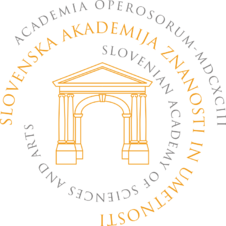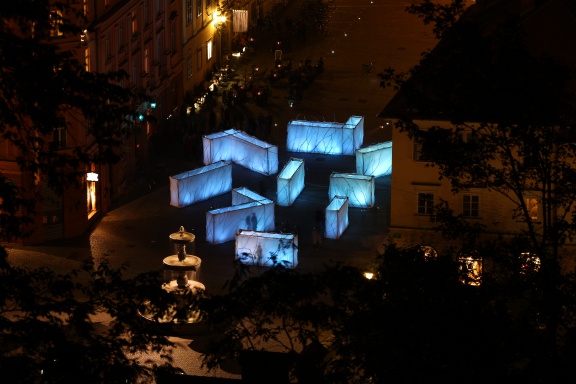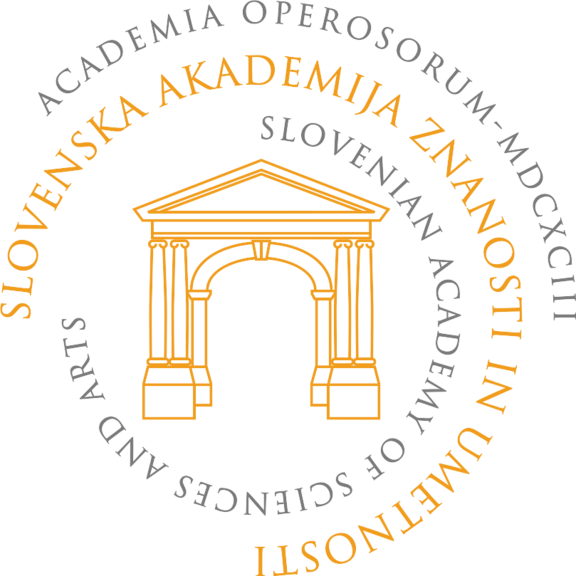Difference between revisions of "Slovene Academy of Sciences and Arts (SAZU)"
Dare Pejić (talk | contribs) |
(mwtool_article) |
||
| (22 intermediate revisions by 5 users not shown) | |||
| Line 1: | Line 1: | ||
{{Article | {{Article | ||
| − | | status = | + | | status = NIFERTIK! |
| maintainer = Dare Pejić | | maintainer = Dare Pejić | ||
}} | }} | ||
| Line 6: | Line 6: | ||
| name = Slovene Academy of Sciences and Arts (SAZU) | | name = Slovene Academy of Sciences and Arts (SAZU) | ||
| localname = Slovenska akademija znanosti in umetnosti (SAZU) | | localname = Slovenska akademija znanosti in umetnosti (SAZU) | ||
| + | | logo = Slovene Academy of Sciences and Arts (SAZU) (logo).svg | ||
| street = Novi trg 3-5 | | street = Novi trg 3-5 | ||
| town = SI-1001 Ljubljana | | town = SI-1001 Ljubljana | ||
| mailing address = P O Box 306, Ljubljana SI-1000, Slovenia | | mailing address = P O Box 306, Ljubljana SI-1000, Slovenia | ||
| + | | map = http://www.openstreetmap.org/?lon=14.50483&lat=46.04775&zoom=17&layer=mapnik | ||
| telephone = 386 (0) 1 470 6100 | | telephone = 386 (0) 1 470 6100 | ||
| fax = 386 (0) 1 425 3423 | | fax = 386 (0) 1 425 3423 | ||
| email = sazu@sazu.si | | email = sazu@sazu.si | ||
| website = http://www.sazu.si | | website = http://www.sazu.si | ||
| + | | founded by = Government of the Republic of Slovenia | ||
| contacts = {{Contact | | contacts = {{Contact | ||
| − | | name = | + | | name = Tadej Bajd |
| role = President | | role = President | ||
| − | | mail = | + | | mail = |
}}{{Contact | }}{{Contact | ||
| name = Zoran Mezeg | | name = Zoran Mezeg | ||
| role = Managing Director | | role = Managing Director | ||
| − | | email = | + | | email = |
| telephone = | | telephone = | ||
}}{{Contact | }}{{Contact | ||
| Line 31: | Line 34: | ||
{{Teaser| | {{Teaser| | ||
| − | Established in [[established::1938]], the [[Slovene Academy of Sciences and Arts (SAZU)]] is the supreme national institution for science and the arts, housed in | + | Established in [[established::1938]], the [[Slovene Academy of Sciences and Arts (SAZU)]] is the supreme national institution for science and the arts, housed in an 18th-century baroque palace in the historical centre of Ljubljana. SAZU associates scientists and artists who have been elected as its members for their outstanding achievements in the field of sciences and arts. |
}} | }} | ||
==Mission== | ==Mission== | ||
| − | The | + | The academy cultivates, encourages, and promotes sciences and arts and, through its activities, contributes to the development of scientific thought and creativity in the arts, particularly by: addressing basic issues of sciences and arts; participating in establishing the policies of research activities and creativity in arts; giving appraisals, proposals and opinions on the position, development, and promotion of sciences and arts and on the organisation of research activities and creativity in the arts; organising research work, also in cooperation with universities and other research institutions, particularly in the fields which are important for the awareness of and gaining insight into the natural and cultural heritage of the Slovene nation and for the development of its language and culture; and developing international cooperation in the field of sciences and arts. SAZU joined the European Scientific Foundation in 1995. |
==Structure== | ==Structure== | ||
| − | The President, the two Vice-Presidents, the Secretary General and the Secretaries of its various Sections are elected for a period of three years with the possibility of one further re-election. SAZU can have a maximum of 60 full and 30 associate members; at present it has | + | The President, the two Vice-Presidents, the Secretary General and the Secretaries of its various Sections are elected for a period of three years with the possibility of one further re-election. SAZU can have a maximum of 60 full and 30 associate members; at present it has 87 full and 9 associate members. It can also have a maximum of 90 corresponding members from scientific institutions abroad; at present it has 74 such members. |
==Sections== | ==Sections== | ||
| − | SAZU is active in different fields of research, as reflected in the corresponding six sections of the Academy: | + | SAZU is active in different fields of research, as reflected in the corresponding six sections of the Academy: the Section of Historical and Social Sciences (the section comprises two subsections: Historical Sciences and Social Sciences); the Section of Philological and Literary Sciences; the Section of Mathematical, Physical, Chemical and Technical Sciences (it comprises of two subsections: Mathematical, Physical and Chemical Sciences and Technical Sciences); the Section of Natural Sciences; the Section of Medical Sciences, and the Section of Arts. |
==Institutes and units== | ==Institutes and units== | ||
| − | SAZU has founded | + | SAZU has founded 18 important research institutes from the fields of the humanities and natural sciences, each of which functions an autonomous research organisation, yet falls under the overall management of the [[Scientific Research Centre (ZRC SAZU), Slovene Academy of Science and Arts|Academy's Scientific Research Centre (ZRC SAZU)]]. |
| − | SAZU also has several special units, including the Department for International Relations and Scientific Co-ordination is headed by a full member of SAZU and the [[Slovene Academy of Sciences and Arts (SAZU) Library]], the | + | SAZU also has several special units, including the Department for International Relations and Scientific Co-ordination which is headed by a full member of SAZU and the [[Slovene Academy of Sciences and Arts (SAZU) Library]], the largest special library which regularly exchanges publications with scientific institutions all over the world. |
| + | |||
| + | == International cooperation == | ||
| + | International cooperation is conducted by the Department for International Relations and Scientific Co-ordination. At present the academy has signed agreements with 38 foreign world-wide academies and is a member of several networks: the European Federation of National Academies of Sciences and Humanities (ALLEA), the European Academies Science Advisory Council (EASAC), the International Academy of Pathology (IAP), the Inter Academy Medical Panel (IAMP), l'Union Académique Internationale (UAI), and the International Human Rights Network (IHRN). | ||
== See also == | == See also == | ||
| Line 55: | Line 61: | ||
== External links == | == External links == | ||
*[http://www.sazu.si/en/ Slovene Academy of Sciences and Arts (SAZU) website] | *[http://www.sazu.si/en/ Slovene Academy of Sciences and Arts (SAZU) website] | ||
| + | |||
| + | {{gallery}} | ||
[[Category:Research]] | [[Category:Research]] | ||
| + | [[Category:Archival research]] | ||
| + | [[Category:Cultural management research]] | ||
| + | [[Category:Heritage research]] | ||
| + | [[Category:Literature research]] | ||
| + | [[Category:Music research]] | ||
| + | [[Category:Visual arts research]] | ||
| + | [[Category:Archival_&_librarian_education_and_research]] | ||
| + | [[Category:Cultural_heritage_education_and_research]] | ||
| + | [[Category:Literature_education_and_research]] | ||
| + | [[Category:Music_education_and_research]] | ||
| + | [[Category:Education_and_Research]] | ||
Latest revision as of 01:45, 19 February 2021
-
to
7 Aug 2015
27 Sep 2015
Masters and their masters – Tradition and continuity in Slovenian painting, an exhibition featuring works of a number of Slovene artists, curated by Milček Komelj (Slovene Academy of Sciences and Arts (SAZU)), organised by the Lendava-Lendva Gallery and Museum in cooperation with the Embassy of the Republic of Slovenia Budapest and the Academy of Fine Arts and Design,
-
6 Oct 2012
100YC Spaceship, a panel discussion continuing the activities of the Slovene pavilion at the 13th Venice Biennale of Architecture, also featuring Krištof Oštir (SAZU)
Mission
The academy cultivates, encourages, and promotes sciences and arts and, through its activities, contributes to the development of scientific thought and creativity in the arts, particularly by: addressing basic issues of sciences and arts; participating in establishing the policies of research activities and creativity in arts; giving appraisals, proposals and opinions on the position, development, and promotion of sciences and arts and on the organisation of research activities and creativity in the arts; organising research work, also in cooperation with universities and other research institutions, particularly in the fields which are important for the awareness of and gaining insight into the natural and cultural heritage of the Slovene nation and for the development of its language and culture; and developing international cooperation in the field of sciences and arts. SAZU joined the European Scientific Foundation in 1995.
Structure
The President, the two Vice-Presidents, the Secretary General and the Secretaries of its various Sections are elected for a period of three years with the possibility of one further re-election. SAZU can have a maximum of 60 full and 30 associate members; at present it has 87 full and 9 associate members. It can also have a maximum of 90 corresponding members from scientific institutions abroad; at present it has 74 such members.
Sections
SAZU is active in different fields of research, as reflected in the corresponding six sections of the Academy: the Section of Historical and Social Sciences (the section comprises two subsections: Historical Sciences and Social Sciences); the Section of Philological and Literary Sciences; the Section of Mathematical, Physical, Chemical and Technical Sciences (it comprises of two subsections: Mathematical, Physical and Chemical Sciences and Technical Sciences); the Section of Natural Sciences; the Section of Medical Sciences, and the Section of Arts.
Institutes and units
SAZU has founded 18 important research institutes from the fields of the humanities and natural sciences, each of which functions an autonomous research organisation, yet falls under the overall management of the Academy's Scientific Research Centre (ZRC SAZU).
SAZU also has several special units, including the Department for International Relations and Scientific Co-ordination which is headed by a full member of SAZU and the Slovene Academy of Sciences and Arts (SAZU) Library, the largest special library which regularly exchanges publications with scientific institutions all over the world.
International cooperation
International cooperation is conducted by the Department for International Relations and Scientific Co-ordination. At present the academy has signed agreements with 38 foreign world-wide academies and is a member of several networks: the European Federation of National Academies of Sciences and Humanities (ALLEA), the European Academies Science Advisory Council (EASAC), the International Academy of Pathology (IAP), the Inter Academy Medical Panel (IAMP), l'Union Académique Internationale (UAI), and the International Human Rights Network (IHRN).
See also
- Slovene Academy of Sciences and Arts (SAZU) Library
- Scientific Research Centre (ZRC SAZU), Slovene Academy of Science and Arts





